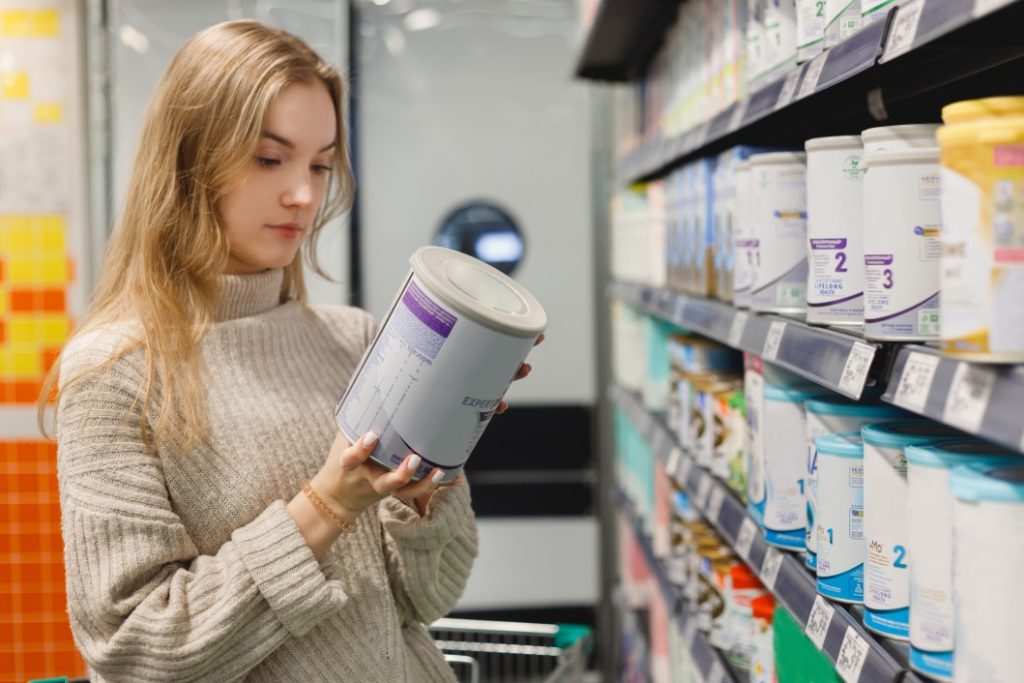The US government has invoked a law made for times of war to try and fix its current baby formula shortage.
Consumers are rarely happy when the item they want to buy is always out of stock, but generally their options are limited to switching to an alternative or going without. Sometimes, however, neither of these choices are acceptable. Take the baby formula shortage currently gripping America, where over 40 percent of formula products were out of stock in May 2022. The issue was caused by a bunch of things going wrong at once: staff shortages, gummed-up supply chains and a safety-scandal-related shutdown of one of the State’s biggest formula factories. Because only 13 percent of infants in the States are exclusively breastfed, the shortages mean there are now an awful lot of babies whose food supply risks being disrupted.
Pretty much everyone agrees that fixing the problem will involve two main groups: the government and businesses. What people don’t agree on is how much responsibility each group should be given… or how much blame. From the government’s perspective, it is the baby food businesses who have fallen short. President Biden has invoked the Defence Protection Act for formula, a law which basically gives his government the right to tell businesses they must now prioritise getting an affordable version of a product on the shelves, regardless of what it does to their bottom line or wider business interests. Part of the reason the government has has done this is that it suspects some baby formula companies of price gouging: taking advantage of the crisis and parents’ desperation by whacking up the cost of formula.
There has been plenty of support for this government intervention. But some economists say that taking action against it in the way the US government has can cause harm in the long run. The thinking goes like this: if money making is the ultimate motivator, then knowing the government might take your money away will discourage new businesses from setting up shop and existing businesses from investing in expanding their operations or improving their product. Why bother if you can’t get rich from such actions? Dispelling business enthusiasm in this way then increases shortages and prices long-term. Of course, not everyone is convinced by this argument. Some people think the idea that everyone is so profit-focused is over simplistic; others that it would take such substantial government meddling to ruin business financials that interventions like this rarely do make many businesses cut and run.
There is also an economic argument that allowing prices to rise in the short-term can fix shortages in the long run. The logic is that high prices will encourage lots of new companies to start making baby formulas to grab a slice of those juicy profits, which then increases the supply of the stuff, which in turn causes prices to fall (because once there’s more formula than people need, shops will have to cut prices to attract shoppers). One problem with this plan is that it still leaves a period of time where feeding their babies would become more of a financial struggle for families, especially lower-income ones. An oft-suggested solution for this is that governments welfare could plug the gap.
The government itself has also come in for some blame for the formula crisis, via the argument that its regulation for the foodstuff was too strict and consequently made the baby food industry smaller and more vulnerable to shortages. It's true that the US has high food-standard requirements for baby formula. The reason is to improve its safety, which most people would agree is very important. However, strict regulation can also make it harder and more expensive for new companies to get into the game. Certainly the industry is very concentrated (i.e. dominated by a few big firms), which is why the sudden shutdown of one company has been such a problem - there aren't many alternative suppliers around to plug the gap.
Of course, nobody wants to replace a formula shortage crisis with an unsafe formula crisis. But it has been suggested that the government has somewhat conflated “safe” with “American”, making it really hard for non-domestic producers to sell baby formula in the country, regardless of how established, trusted and safe their product is. That point may have landed - the American government has recently loosened its restrictions on foreign baby powder, allowing more big British and Australian brands in.
Read our explainer on: how our food get to us

